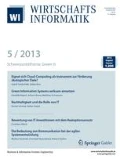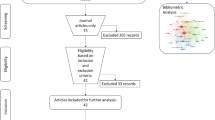Abstract
This paper focuses on the coordination of order and production policies between buyers and suppliers in supply chains. Order quantities and delivery dates have to be negotiated between the supply chain partners. The results of theses negotiations are strongly influenced by the bargaining power of the parties involved. We present a software tool which supports the supplier’s bargaining process. The software tool can be employed for the generation and evaluation of different offers.
Similar content being viewed by others
Literatur
Anupindi, Ravi; Bassok, Yehuda: Supply Contracts with Quantity Commitments and Stochastic Demand. In: Tayur, Sridhar; Ganeshan, Ram; Magazine, Michael (Hrsg.): Quantitative Models for Supply Chain Management. Kluver, Boston 1999, S. 197–232.
Arthur Andersen Business Consulting: Zusammenarbeit oder verschärfte Konkurrenz? Wie wirkt sich das Internet auf die Beschaffungsstrategien für komplexe Materialien in der deutschen Automobilindustrie aus? http://www.arthurandersen.de/AAHome.nsf/d7a25ae.pdf, Abruf am 2003-10-04.
Banerjee, Avijit: A Joint Economic-Lot-Size Model for Purchaser and Vendor. In: Decision Science 17 (1986), S. 292–311.
Busch, Axel; Dangelmaier, Wilhelm: Integriertes Supply Chain Management — ein koordinationsorientierter Überblick. In: Busch, Axel; Dangelmaier, Wilhelm (Hrsg.): Integriertes Supply Chain Management. Gabler, Wiesbaden 2002, S. 1–21.
Buxmann, Peter; Martín Díaz, Luis; von Ahsen, Anette: Kooperationen in Supply-Chains — Ökonomische Bewertungsansätze eines Simulationsmodells. In: Wirtschaftsinformatik 45 (2003) 5, S. 509–514.
Buxmann, Peter; König, Wolfgang; Fricke, Markus; Hollich, Franz; Martín Díaz, Luis; Weber, Sascha: Zwischenbetriebliche Kooperationen mit mySAP.com — Aufbau und Betrieb von Logistiknetzwerken. 2. Auflage, Springer, Berlin 2003.
Chen, Frank; Drezner, Zvi; Ryan, Jennifer K.; Simchi-Levi, David: Quantifying the Bullwhip Effect in a Simple Supply Chain: The Impact of Forecasting, Lead Times, and Information. In: Management Science 46 (2000) 3, S. 436–443.
Christopher, Martin: Logistics and Supply Chain Management — Strategies for Reducing Cost and Improving Service. 2. Auflage, Financial Times Prentice Hall, New York 1998.
Corsten, Hans; Gössinger, Ralf: Einführung in das Supply Chain Management. Oldenbourg Verlag, München 2001.
Feldmann, Martin; Müller, Stephanie: An incentive scheme for true information providing in Supply Chains. In: Omega 31 (2003), S. 63–73.
Goyal, Suresh K.; Nebebe, Fassil: Determination of economic production — shipment policy for a single-vendor-single-buyer system. In: European Journal of Operational Research 121 (2000), S. 175–178.
Goyal, Suresh K.: A Joint Economic-Lot-Size Model for Purchaser and Vendor: A Comment. In: Decision Science 19 (1988), S. 236–241.
Hahn, Dietger: Problemfelder des Supply Chain Management. In: Wildemann, Horst (Hrsg.): Supply Chain Management. München 2000, S. 9–19.
Kersten, Wolfgang; Kern, Eva-Maria; Koeppen, Birgit: Internetgestützte Beschaffung komplexer Zulieferteile in der Automobilindustrie — Wertschöpfungspartnerschaften im Wandel? In: Wildemann, Horst (Hrsg.): Moderne Produktionskonzepte, München 2003.
Knolmayer, Gerhard; Mertens, Peter; Zeier, Alexander: Supply Chain Management auf Basis von SAP-Systemen — Perspektiven der Auftragsabwicklung für Industriebetriebe. Springer, Berlin 2000.
Mau, Markus: Supply Chain Management — Prozessoptimierung entlang der Wertschöpfungskette. WILEY-VCH Verlag, Weinheim 2003.
Mertens, Peter; Bodendorf, Peter; König, Wolfgang; Picot, Arnold; Schumann, Matthias; Hess, Thomas: Grundzüge der Wirtschaftsinformatik. 8. Auflage, Springer, Berlin 2004.
Miller, Pam Anders; Kelle, Peter: Quantitative Support for Buyer-Supplier Negotiation in Just-In-Time Purchasing. In: International Journal of Purchasing and Materials Management, 1998, S. 25–29.
Pibernik, Richard; Sucky, Eric: Zentrales und dezentrales Supply Chain Planning. In: WiSt Wirtschaftswissenschaftliches Studium 33 (2004) 1, S. 25–31.
Pibernik, Richard; Sucky, Eric: Zentrales und dezentrales Supply Chain Planning am Beispiel einer Supply Chain der Pharma-Industrie. In: WiSt Wirtschaftswissenschaftliches Studium 33 (2004) 1, S. 59–64.
SAP (Hrsg.): SAP Advanced Planner and Optimizer Collaborative Planning — Von der Logistikkette zu Collaborative-Commerce-Networks. White Paper,Walldorf 1999.
Schenk-Mathes, Heike: Gestaltung von Lieferbeziehungen bei Informationsasymmetrie. Gabler, Wiesbaden 1999.
Schneidereit, Gabriele; Voß, Stefan: Vertragsgestaltung in der Supply Chain. In: Dangelmaier, Wilhelm; Pape, Ulrich; Rüther, Michael (Hrsg.): Die Supply Chain im Zeitalter von E-Business und Global Sourcing. Paderborn 2001, S. 421–433.
Silver, Edward A.; Pyke, David F.; Peterson, Rein: Inventory Management and Production Planning and Scheduling. Wiley, New York 1998.
Stadtler, Hartmut: Advanced Planning Systems — Basics and beyond. In: Fandel, Günter; Backes-Gellner, Uschi; Schlüter, Manfred, Staufenbiel, Joerg E. (Hrsg.): Modern Concepts of the Theory of the Firm — Managing Enterprises of the New Economy. Springer, Berlin 2004, S. 285–300.
Steven, Marion; Krüger, Rolf: Advanced Planning Systems — Grundlagen, Funktionalitä- ten, Anwendungen. In: Busch, Axel; Dangelmaier, Wilhelm (Hrsg.): Integriertes Supply Chain Management. Gabler, Wiesbaden 2002, S. 169–186.
Sucky, Eric: A Single Buyer-Single Supplier Bargaining Problem with Asymmetric Information — Theoretical Approach and Software Implementation. In: Proceedings of the 36th Hawaii International Conference on System Sciences (HICSS 36).
Sucky, Eric: Coordinated order and production policies in supply chains. In: OR Spectrum 26 (2004), S. 493–520.
Voß, Stefan; Schneidereit, Gabriele: Interdependencies between Supply Contracts and Transaction Costs. In: Seuring, Stefan; Goldbach, Maria (Hrsg.): Cost Management in Supply Chains. Physica-Verlag, Berlin 2002, S. 255–274.
Windischer, Anna; Mathier, Fabienne; Grote, Gudela: Kooperatives Planen im Supply-Chain-Management. In: Zeitschrift für Führung und Organisation 71 (2002) 1, S. 14–21.
Zäpfel, Günther: Supply Chain Management. In: Baumgarten, Helmut; Wiendahl, Hans-Peter; Zentes, Joachim (Hrsg.): Logistik-Management. Springer, Berlin 2000, Abschnitt 7-02-03, S. 1–32.
Author information
Authors and Affiliations
Rights and permissions
About this article
Cite this article
Sucky, E. Softwaregestützte Verhandlung in Supply-Chains. Wirtschaftsinf 46, 459–469 (2004). https://doi.org/10.1007/BF03250963
Issue Date:
DOI: https://doi.org/10.1007/BF03250963




